|
AT THE CINEMA
ON THE BBC I-PLAYER FROM THE ARCHIVE |
Reflections on a
visit to France It's easy to forget just how great France is, sitting just the other side of the English Channel. For those with the maturity and time to appreciate what they see, the differences with England are endless. There are those broad boulevards, nice and straight, with buildings set well back behind wide pavements, in a town like Le Havre for example. Having gone there recently to see a friend off on a cruise, I couldn't help marvelling at how different it was from dear old England. Instead of those tiny little higgledey-piggledy streets we have, everything was on a much broader scale. Obviously France is a much bigger country, and there's plenty of room to spread out, and French town planners has taken full advantage of it. The result is a marvellous combination of space for people and well-designed housing, most of it built in the reconstruction period in Le Havre after World War Two. There was plenty of room along the grand quay in the centre of Le Havre. Dog walkers, strollers and families sauntered on the wide pavements and areas reserved for pedestrians and children – on a scale you wouldn't find in Britain. How different it all was. How the parking bays at the sides of the streets allowed vehicles to pull up without impeding the traffic flow. And how little traffic there seemed to be, in this port in Normandy, compared to cramped old Britain! Often times the was no traffic coming either way, and it was possible to cross wide roadways without difficulty. How different from Britain, where the next motorist is always waiting to run you down. Of course, being France a rear-guard action is always being fought against globalisation and Americanisation. The local McDonalds had only a muted 'M' outside it, and referred to itself as Ronald McDonald, in faint writing. Neither were the shops open on Wednesday in Dieppe. That French institution, the restrictive practice, was still very much in evidence. The Anglo-Saxon work ethic is still being resisted, by almost all the independently owned shops and stores there. It seems incredibly quaint to English people that shops should close on a Wednesday. Forty or fifty years ago in England we did the same thing – but not any more. And so I wandered through the maze of old streets in Dieppe, waiting for my ferry back to Britain. The restaurants and funfair alongside one of the quays were still doing business. I saw the old facades of commercial and residential buildings lining the quays. I paused at the gardens outside the town hall, where two tricolores flew by the monument to the glorious dead; and nearby there was a monument to those who had died under fascism, and where somebody had laid a wreath. I looked at the bookshops, with whole shelves devoted to the liberation. It was as though it had happened recently, not eighty years ago. Everywhere I sensed that once great things had happened here. Giant armies had marched through. Although they were long gone their footsteps somehow remained, along with the war memorials on the sea front. I thought of those images I had seen on the train back from Le Havre: of misty fields and tree lines so similar to England; of a green and fertile land; of farm houses and small villages, of towns flashing past, of Normandy villes and tractors. I thought of previous visits to France, when the French railway network had always seemed better than in Britain; but as I looked around now I saw that British trains had in fact caught up; and that it was now French provincial stations which needed more investment. Ah yes, L'exception Francaise. The country that could close on Wednesdays, have a work-life balance, and go home at five. The cracks are just starting to show in that facade, but for now at least France remains a fabulous contrast to England. Nye, at the
The National Theatre Martin Sheen spends the performance in pyjamas,
reducing Nye Bevan to panto Source: National Theatre This play does a grave disservice to Aneurin Bevan. It treats him as a comedic, almost pantomime figure, forever striding about in his pyjamas. Martin Sheen does well enough with the script, but this play fails to represent Aneurin Bevan as he really was. Whatever else Aneurin or 'Nye' Bevan was, he certainly wasn't a comedy character, constantly grinning at the audience. He was an intensely driven socialist, formed by his upbringing in the unemployed and under-employed valleys of South Wales. And now we come to another problem: this play gives us no sense of time or place. Nye Bevan was created by the conditions he grew up in: a region with a very specific cultural, linguistic and religious (Methodist) background, as well as a political one, but that seems strangely absent. That essential Welshness wasn't there – except for his accent of course. Yet Nye Bevan could not be separated from his Welshness for an instant. But there are many other contradictions. One is that although the NHS is apparently popular in the UK, no other major developed country has copied it. Could there be a reason for this? And why are outcomes often so much worse in Britain than in our major European counterparts, who don't have a monolithic system? It's all a bit different from the view on offer in this play. Here the formation of the NHS is taken for granted as a good thing. But was it? Or would a system of co-payment have produced better results? But this play deals in simple certainties. It also deals in annoying choreography, like miming in the background while Nye is talking front of stage. But if your dialogue is any good you don't need background miming. You don't need complicated sets and snazzy lighting effects. Moreover, you don't need to tell the audience what to think: if your play is any good they'll work it out for themselves. And so this play grinds on. More running about in pyjamas. More being lifted aloft by cast members, floating horizontally with the ground. More terrible impersonations of Winston Churchill (didn't they watch any tapes of the grizzled old monster?) It all carries on. If you're looking for one last little ironic twist at the end, that the system he set up couldn't save him, hope on. Even that delicious irony was lost on the author of this play. No doubt he was too busy planning another bit of annoying choreography. I once saw a book entitled 'Nye Bevan and the mirage of British Socialism.' I never read it, but I can't think of a better title. Nye Bevan was a man who spent his life swimming against the tide. He was a socialist in a country that never really liked socialism. He was Welsh in a country that is predominantly English. He was determined to bring about change, when most people preferred the status quo. Somehow – and against great opposition from the doctors – he managed to set up the NHS. He produced a permanent institution which is always associated with him. But did he really do the right thing? With a system less good than our nearest European neighbours? The audience certainly seemed to think so, and so did the cast, and the playwright and the National Theatre. Ah well then. They must be right. A King's Story:
The Memoirs of HRH The Duke Of Windsor A King's Story: Edward VIII's acccount of his life and divorce
Re-published by Prion Books Ltd Source: Prion Books This is a fascinating account of the life and abdication of Edward VIII, written by the man who actually went through it himself. What emerges most clearly from this book is what an intelligent, thoughtful and reasonable man Edward VIII actually was. His maturity, reasonableness and essentially liberal outlook is plain to see. His enlightenment shines through these pages – of a man destined for kingship who could see both sides of his future role: both the importance of a constitutional monarch in a democracy, but also the slight ridiculousness of it, of having someone as head of state simply by birth. In view of all this reasonableness and enlightenment therefore, it is all the more puzzling that he should have thrown it all away over Wallace Simpson, an American tramp to whom he could not be legally married. And here is where this book is so frustrating. Although this book is readable, so that the pages keep turning themselves, giving many insights into his life and his long apprenticeship as king-in-waiting, when it comes to why he was so pazzo over Wallace Simpson, it gives no clues. Of course it mentions Wallace frequently, particularly towards the end. But no clues are given as to her essential attractiveness to him, to the extent that he gave up the throne. No matter. There is still plenty to enjoy here. There are the meetings with other heads of state, in that halcyon period before the First World War. He remembers 'Uncle Nicky' – that's the last Tsar of Russia, Nickolas II to the rest of us. Then there was his meeting with the Kaiser of Germany. The Kaiser, it turns out, was a strange man. Chippy, argumentative, authoritarian. A good speaker of English, but inclined to bombast, who wore a series of uniforms, each more resplendent than the last, as he escorted the young Prince Edward to a performance of Aida in the evening. Then there was the Balkan tour. He met Ataturk, father of modern Turkey 'who had the most piercing eyes I have ever seen'. Then there were the other Balkan princes and potentiates – few of whom would survive two world wars. And on the subject of war, Edward was again keen to get away from his gilded cage, when he was attached to headquarters during the First World War. Here again, he managed to dodge the formality of central command, and got out and about among the men. He got close enough to the front for his driver to be killed, and pedalled his way about behind the lines on nothing more than a bicycle. Small wonder then that at reunion parades after the First World War he was mobbed by survivors and veterans. Indeed, everything about Edwaard seemed to point to a long and successful reign. His tours of the dominions and colonies were successful, where again he was mobbed in Canada, New Zealand and Australia. Even in India, already buzzing with sedition, and Gandhi doing his best to ruin Edward's tour, many local Indians came out in support of their future Emperor. Where then did it all go wrong? The answer of course was love and the blunt immobility of the then Prime Minister, Stanley Baldwin. There was talk of a morganatic marriage, in other words a marriage in which Wallace would be his wife but not Queen, nor have the titles normally bestowed on the spouse of a sovereign. But this meant nothing to Baldwin. He threatened to quit if such a proposal was taken forward and the prospect foundered. Actually there was evidence of considerable sympathy towards Edward VIII's plight, with spontaneous demonstrations of support for the king outside the palace, and even talk of a 'King's party'. But Edward was far too smart to rely on that. He knew that in the face of the blunt rejection of Stanley Baldwin, any attempt to marry would cause far too much division - and it was over. Reading this book it is impossible to avoid the conclusion that Edward VIII was the best king we never had. His intelligence and judgement would have been of profound benefit, and he had abilities far beyond his more workman-like brother Bertie, the stuttering Geroge VI. What other sovereign would have gone into the coalfields and looked unemployed men in the eye? Who else would have gone to Tyneside, and spoken to a riveter, who had not worked for five years? Truly this was a man who was aware of all his kingdom, and not just the Grenadiers on Horseguards parade. Yet Edward slipped away. After the abdication documents were signed, he went to the continent on board a navy destroyer, appropriately enough in the dark. He lived out the rest of his life, with nothing to do. During the war years he was made governor of Bermuda, so as to keep him safely from harm's way, but with peace time returning, he was left to his own devices. From then on he was a non-person, who could not return to Britain: an exile, a lizard in a lounge suit with nothing to do, in a large house on the outskirts of Paris. It was a sad ending to such a brilliant start; but without it Bertie would never have become king – and without that we would never in turn have had his eldest daughter Elizabeth as our sovereign. Such are the twists and turns of fate, where greatness, glorious reigns and longevity all hang by a thread. Palace Papers
By Tina Brown 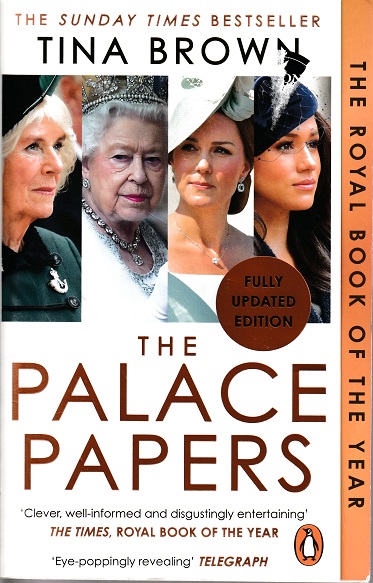
The Palace Papers: a massive seller for Tina Brown Source: Random House
What strikes you most is how different the royals really are. They might go to aids orphanages, meet with homeless people and glad-hand with the poor, but really they are utterly, utterly different from us. It's a world we can hardly imagine. A world of palaces and stately homes. A world of butlers and servants and scampering domestic staff. It's a world of glittering social functions and cut glass and white tie functions – and of course the countryside. For what the first 150 pages or so of this book really tell us (and this is by far the best part of the book) is that the blue-blooded ruling class are most at home in the countryside. Only London lefties and progressives stay in the capital at weekends. The people who count, the real people are at their most authentic in the countryside. And by the countryside we don't mean some little semi-detached house on an estate in Gloucester. We mean a stately home, where guests who live in other stately homes may call, in a never-ending round of raucous and decidedly un-intellectual drinks and dinner parties. And what do these people in stately homes also do, when they are not entertaining people from other stately homes? Why of course they hunt. Are yes. Hunting. The inexecrable in pursuit of the inedible, as Oscar Wilde put it. For without hunting it would be impossible to imagine the lives of the county set. Hunting. Yes. The smell of cracked leather on horses' flanks. The thunder of hooves. The bottoms of the scions of the landed rich lifted out of their saddles as they tilt at the next hedge. And in all this, Camilla hunted her own little fox, a particularly important and significant one called Prince Charles. She pursued him relentlessly but skilfully, obeying all the rules of the gel in the countryside, who knew how to use a fish knife, wear a tiara properly, and fool around with the prince with elan. Camilla and Charles: after a lot of hunting she finally got her fox. Source: People
Of course it didn't matter to Camilla that she was already married. After all her husband Andrew Parker Bowles was also playing the field as wantonly as she was. In a whirlwind of hunt balls, drinks parties, weekends away (not to mention the shooting) she won her man and stayed with him. As you read this brilliantly and eruditely written tome, your will shake your head and your jaw will drop, as you read for example that Prince Charles (as he then was) liked to sleep in his own bed, wherever he was. If that meant a lorry had to be commissioned to bring all his things for one night's stay at a country house somewhere, then so be it. And not just his bed either; for he liked to have his own pictures on the walls of whatever bedroom he was sleeping in, even if that meant removing everything that was normally in there. Then there were the teddy bears. For some reason the senior royals seemed tremendously attached to these childhood comforts. Prince Andrew even used to supply a photo for his domestic staff to refer to, so that they could lay out his fifty-strong collection in the right order. It goes on and on. In the mad world of the royals no absurdity seems too great to be possible, no peccadillo too ridiculous. The Queen, herself a modest and abstemious individual, must surely have shook her head at some of her sons' antics. In this brief review it is impossible to do full service to the daft decision making of her sons, daughters-in-law and wider family. Islands of restraint like Princess Anne, who has applied herself diligently and responsibly to the service of the nation stand out like islands in a sea of daftness. There was Charles' affection for Saudi and Gulf princes, from whom he hoped to solicit donations to his charities. There were Andrew's cosy arrangements with Kazakh oligarchs, one of whom brought his bad-taste Southfork-style ranch palace for several million pounds more than its market price, and then there was Sophie Wessex's idiotic agreement to accept cash for access to the royals – except it was a set-up by investigative reporters. And now we come to the question of money – or rather the lack of it. For one of the things nearly all the royals face is that they have a taste for the high life without the income to pay for it. As royals they can hardly start businesses, but on the other hand they are like to travel first class and stay in the finest hotels. Perhaps this explains the endless embarrassments, stings and connections with dodgy magnates that have rocked the royals. Neither was Camilla much better. She was running an overdraft at Coutts bank (where else?) for £130,000 – quite a lot of money at the time, until Charles took care of it out of the proceeds of his income from the Duchy of Lancaster. Coutts Bank, The Strand, London: only high rollers need apply. Source: Times of London
And so the narrative rolls on, through the Diana years, which must have been excruciating for the Queen. 'Never again,' was the frequently quoted mantra at the palace, long after she was finally laid to rest. Interestingly, it was Camilla who gave her seal of approval to Charles' marriage to this wide-eyed child-bride. 'A perfect little poppet,' is how Camilla is alleged to have regarded Diana – this apparently innocuous little deb who had 'kept herself tidy', whom Camilla thought would be the perfect baby machine for Charles, while he crept away at weekends for trysts with Camilla. Of course it didn't work out that way. As Tina Brown points out, the Queen, so good at selecting bloodlines in horses, failed to spot how difficult and dysfunctional the Spencers could be – this ancient English family that had been close to the Court of St James for more than 500 years. Neither do the below-stairs team come out of all this with much glory. Tina Brown paints a picture of snobbery (the inverted kind, always much better) of the below-stairs employees. The daft titles (someone is apparently the Master of the Pantry, whatever that means) but above all the rampant homosexuality and criminality, where Charles turned a blind eye to his staff flogging off unwanted gifts to such a degree that Michael Fawcett, his chief aide-de-camp became known as 'Fawcett the Fence'. Then of course there was Paul Burrell, Diana's 'rock' and erstwhile butler, who raised hypocrisy to new levels. He swore he would never write a tell-all book and then he did. When the police raided his house they found Diana's dresses, thousands of negatives, including of William and Harry, which he shouldn't have had. But when the case went to court the Queen had a 'recollection' that she had indeed allowed him to keep some things and the trial collapsed. Yet no one at the palace had thought fit to get a non-disclosure agreement out of him and he was free to sell his story to the Daily Mirror – which he promptly did for £300,000. Paul Burrell: Diana's rock, who sold his story to the Daily Mirror for £300,000 Source: Birmingham Live
You couldn't make it up. You really couldn't. As this dismal cast of characters passes through this book, you can only wonder what the Queen thought of it all. The Blair years brough more travails, with the abolition of fox-hunting (it was all Charles could do to stop Camilla going on the pro-hunting marches to Westminster), the abolition of the House of Lords, the scrapping of the royal yacht Britannia (a particularly cruel blow) and of course the aftermath of the death of Diana, in which Tony Blair more or less told the Queen to leave Balmoral and come back to London. No wonder he didn't get an invitation to the royal wedding of William and Kate. Oh yes, Kate. Thank God she came, the Queen must have thought, as she surveyed the messed-up marriages, philandering and monumental misjudgements of her own children; for she was someone both attractive and intelligent, both calm and reasonable, who would at least bring some normalcy to that mad gene-pool. (Apparently Kate never once lost her temper, had a hissy-fit or tantrum in the build-up to her own wedding.) How pleased the Queen must have been, that despite everything by the end of her reign she had secured the monarchy. She had a grandson, William who although not that bright would be OK, married to an intelligent young woman who knew what to do, and already had three great-grandchildren, one of whom - little George - posed with his parents and his grandmother in a picture on the palace balcony that said it all: that after Charles the monarchy would be in safe hands, that the succession has been assured for at least two more generations; and that for the foreseeable future all will be well. The final chapters of this book are more muted. It's as though the lawyers have been through every word of the account of how Harry and Megan left the royal pack. Absolutely nothing exceptional is said. But by then the reader has already had a wonderful ride. We have had a peep behind the curtain. We have learned that the Queen wasn't particularly fond of her son Charles, and that she preferred Andrew, who was allowed to have the run of Buckingham Palace. But Andrew merely repaid this generosity by inviting the now-disgraced Ghislaine Maxwell to call, (friend of serial sex-offender and financier Geoffrey Epstein) who made so many visits she didn't even bother to sign in when she arrived. What emerges is a world within a world. A world of inverted snobbery, of palaces and servants, of financial illiteracy and country houses. Of shoots and hunts and Scottish glens – all this a million miles away from most people's experience of life. But the British people are a forgiving lot. Despite the toe-sucking antics of Sarah Ferguson (she got chucked out of Sandringham for that) and Andrew's appalling behaviour, despite the undercover stings and blood sports and the ancient privileges, despite all the toadies and the hangers-on, despite all this the royals remain a cherished institution. Perhaps it is the fear of something worse that keeps us coming back for more – the fear of that terrible and unknown place, that dark and unthinkable world called a presidency. Perhaps it is the need for ever more royal weddings. Perhaps it is the need to believe that once, just once that fairy tale can come true; and the fact it rarely does hardly seems to matter. For if one thing is certain, it is that sooner or later there will indeed be another royal wedding; and when that happens we will shall all be in the Mall once more. Only The Great And The Good Need Apply...
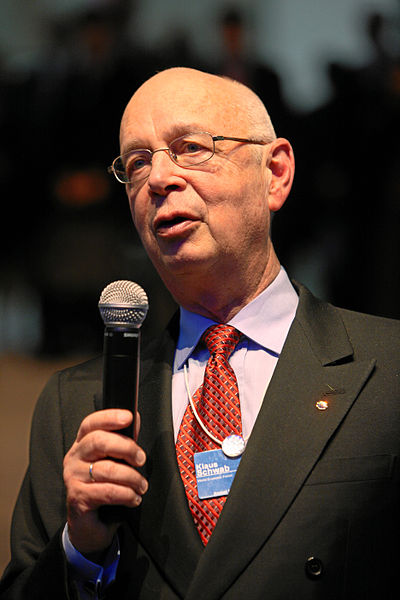
We've been expecting you: Klaus Schwab (photo from 2011) Source: Wikimedia
There's something of the Bond villain about Klaus Schwab, Chairman of the World Economic Forum. As he made his opening remarks at this year's WEF event in Davos Switzerland, you could almost see the ghost of Goldfinger behind him. Was it that ponderous stage-villain German accent, straight from 'From Russia With Love? Or 'Dr No?' As he droned on into the microphone, he seemed to stare directly into the camera, almost daring you to contradict him. 'We face unprecedented challenges,' he opined. Very good. We probably do. And as Klaus continued, in that strange German accent, every word seemed more important than anyone else's, just because he'd said it. But who is Klaus Schwab, and how did he come to occupy such a remarkable position, that every head of state or CEO of worth answers his call to come to Davos once a year, for his annual shin-dig? And how is it that a man who has such an odd English and such a strange on-camera style has such great importance attached to his words, simply because he said them? Back in 1971 Klaus Schwab hit on the idea of an annual conference of the world's great and good. But even this former engineer and economist can never have imagined it would become as successful as this. To limit numbers, and to assure only the best – and therefore only the richest – can attend, numbers of those coming to Davos are limited by price. It's a businessman's dream. Almost infinite demand for places at the most significant gathering of the year means that entry prices need to be very high to control demand. 'It cost me a quarter of a million dollars,' moaned one former hedge fund manager, who still felt compelled to come. Yes. A cool quarter of a million. If you want to take several people with you the bill could easily rise to half a million; and off-camera seminars and private events cost even more. Yet the great and the good still come. Perhaps that's why they do - because most people can't afford to. Over a thousand private jets flew into Davos for this meeting. Perhaps that says more than anything about this event – that if you fly on scheduled aircraft you aren't important enough. Yet it would be unfair to write this event off as simply a giant networking party for the great and the good. There are genuine insights at the public forums: meetings of minds from across the world on-stage, albeit sometimes in the most ponderous of English. But even the most cynical of people must admit it's not often you get the opportunity to listen to a round-table discussion with the CEOs of companies of the size of Google, Nokia and Hewlett Packard. There is also a sense of change, that the world is moving away from fossil fuels, and that a giant re-balancing of our economies is taking place. There is a sense that climate change is a real danger, and we must move away from unstable suppliers of natural gas and oil, who may hold us to ransom. Somewhere in this mass of CEOs, heads of non-governmental organisations and prime ministers, there is a longing for a better world. It might be a world viewed through the profit-and-loss columns of some very rich companies; it might be a world in which the race to be first in tech carries huge rewards; but just occasionally you sense a genuine wish to do good, to raise educational standards in sub-Saharan Africa, to attach more people to the web, or to educate our young in ways which mean they are not mired in debt. Of course from Klaus Schwab's point of view these moments of idealism are marvellous – they add even more value to his business, sorry to the World Economic Forum. There's nothing better for the WEF than a bit of genuine hope or insight, which some of the on-camera public debates provided. But we shouldn't be too cynical. A few years ago some delegates at a previous WEF meeting were having coffee in a smart cafe near Davos. Someone suggested the idea of battery passports, which would ensure minimum standards in terms of the provenance of battery materials, the conditions in which they were extracted and refined, and recyclability of the battery. This year one of the people at that discussion was able to announce the roll-out of the first world-wide battery passport scheme – one small step in mankind's battle to avoid catasrophic climate change. What Did he Think He Was Doing?

What has Harry been doing? He has written a tell-all memoir, a lets-take-it-from-the-top account of his life as a royal. Of course tell-all memoirs by people connected with the Royal Family are nothing new. Most notably Crawfie, Queen Elizabeth's nanny did it, as have numerous butlers, equerries and diplomatic close protection officers. But this is different. This is Prince Harry. A senior royal. Who has done the unpardonable thing: a tell-all tale, invading his own privacy to dish the dirt on his own family in a shocking and intimate way. Make no mistake. This book will take a lot of getting over. Of all the unwritten rules, the one keeping the veil drawn, to respect the mystique and the mystery of the Royal Family, to never complain or explain – that has been the way the royals do it. They stick together. They obey the family mantra, but above all, they do not write tell-all memoirs – and that is exactly what Harry has done. It is too early to fully assess the extent of the damage. Newspaper articles are tomorrow's fish and chip wrappings. A You-Tube Oprah Winfrey interview can be withdrawn; but a book lasts for ever. Books sit on shelves in libraries and schools. They get taken down, referred to for years to come. They are like lines in the sand, tent-pegs driven into the earth, and they can't be taken down like You-Tube videos. What on earth did Harry think he was doing? To write such a tome? To think – and then do – the unthinkable? For that there's a woman to blame. That woman is of course Megan, who has effectively dominated his life since they met. Megan is his beginning and his end, the woman he can't see past or around, the light of his life which illuminates everything. 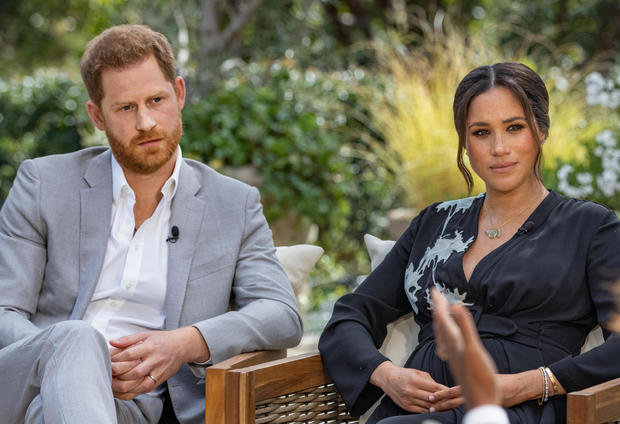
Going all-in: Harry's wearing the suit, but who's really wearing the trousers? Source: CBS
And it is because of Meghan that Harry has written this book. He has bought into her, into her world view, into her woke progressive agenda. He has become a part of her, and in so doing rejected his own family, his upbringing and his own former way of life. That's why the book is so unkind. It reveals things that didn't need to be revealed, shouldn't have been revealed. It is filled with pettiness, with unresolved grievance, and the occasional falsehood. It makes a further break with his brother, with whom he was once so close - and all this for so little. Harry is reputed to have been given a large advance for this book. But it is still much smaller than his Netflix deal. Did he really have to add this extra layer of ire, when he had already made so much money trashing his family in a so-called documentary, hardly more than a whinge-athon to tinkling piano music? But Harry is all in. He is completely invested. He is up to his armpits – or maybe his eyeballs – in all this. He has fallen under the spell of a much smarter woman, who knows much more about life, how to get what she wants, and how to do things. The real problem is that Harry is out of his depth. He has fallen in love with a clever and worldly-wise woman. He has chipped in his own two-penneth, with this unfortunate tome, which did not need to be written. He could have smiled politely, let his wife trash the English royals and say little. He could have been gently apologetic for her excess, putting it down to her American style. He could have stepped back, not stuck the knife into his whole background and upbringing – but he didn't do that. Oh no. He's invested. And that book he didn't need to write will always be there. Megan's much smarter. That interview with Oprah Winfrey has disappeared from the net, leaving little trace of its nastiness. But long after Harry and Meghan's alternative monarchy has fallen away, long after the Netflix documentaries and the awards for standing up to racism in the Royal Family, long after what eventually may happen, that book will still be there, sitting on a shelf somewhere staring at Harry, reminding him of what a twit he has been. Red Plastic Chairs and Cigarettes: Wilson Resigns
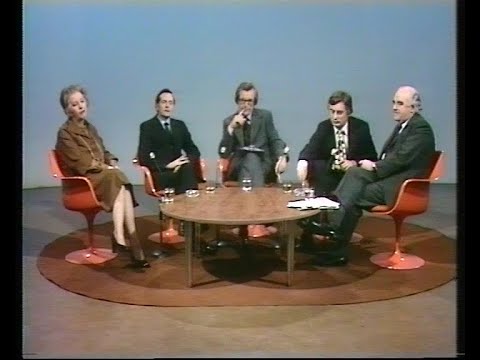
Source: YouTube. To watch the clip Click here
Sometimes a twenty-minute clip from YouTube can be loaded with significance and meaning. Such is the case with this little gem. There is so much in this clip, if you bother to look. Ostensibly about the resignation of Harold Wilson, this clip is loaded with signposts from a forgotten age. There are those revolting red plastic chairs – so popular in the early seventies. There are the people themselves, a hirsute Jonathan Dimbleby (now retired) and Brian Walden, then a Labour MP, actually smoking a cigarette at the beginning. Then there was Judith Hart, doyenne of the Tribune Group of Labour MPs (remember them!) But above all there was the event itself: the resignation of Harold Wilson. Of course no one knew then that the real reason for his resignation was that he knew he could no longer really do his job, because his powers were fading, due to the onset of Alzheimer's. All that was still in the future. The contributors to the discussion simply took Wilson's word for it, that he had had enough of the hurly-burly of frontline politics. But behind all this marks a deeper watershed: the beginning of the end of the old Britain: that Britain of industrial strife, of record numbers of days lost to strikes, of income policies and rampant inflation, and a sinking pound. This was a time of beer and sandwiches at Number 10 Downing Street, as union leaders who were household names in their own right, told the Prime Minister what pay rises they would accept. It was the time of the three-day week and the lights going out, because the power workers were on strike. But little did any of those contributors know that it was all coming to an end. What would Brian Walden have said, on that evening in the studio, if he had known that the old status quo, that world of inflation and incomes policies was going to be swept away, by a lady from Finchley called Mrs Thatcher? They simply had no idea – not Robert Carvel nor Judith Hart nor Peter Jenkins – of what was coming. Of course, there were three more years of Labour to run, under Jim Callaghan, before that fateful election of 1979, when everything changed for ever. But perhaps Robert Carvel was more right than he realised when he said: 'One thing's for sure. The next leader of the Labour party won't last as long'. This clip is fascinating for other reasons too. The central section – featuring an interview with Jim Prior for the Conservatives and Jeremy Thorpe for the Liberals – contains its own inner fascination, for we know what happened to both of them. Jim Prior, looking every inch the senior conservative politician he was, was run over by Mrs Thatcher's juggernaut, a 'wet', a man of irresolute will who was dumped from his place in the cabinet. Jeremy Thorpe meanwhile was to face disgrace for his part in a plot to murder his former lover Norman Scott, and stand trial for it at the Old Bailey. Looking at that clip now, seeing his brooding eyebrows and that dark, almost dangerous face, it seems remarkable that this man in a shirt with a separate collar (look closely) could actually be living such a double life. But those were the times. The time of disguising one's private life. The time of 27% inflation and the six pound-a-week pay policy. It was a time of exchange controls, when there was no internet and the unions controlled the papers. And it was all set to change, although no one at that interview knew how profound that change was going to be. He'll Settle
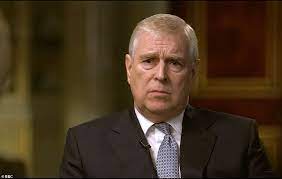
Prince Andrew's legal team are still engaged in delaying tactics, but this case will never go to court. Like the vast majority of other civil cases for compensation in the USA, it will be settle before a trial begins. The only mystery is why things have dragged on as long as they have, bearing in mind how this case will inevitably end. For that Prince Andrew need only look in the nearest mirror, to see the reason staring back at him in the face. And this really is all Prince Andrew's fault. Not the alleged non-consensual sex Virginia Giuffre says she had with him almost 20 years ago; that is not the issue. The issue is how astonishingly badly Prince Andrew has played all this, how he has consistently denied, blocked and refused to accept what a mess he was in, and done anything constructive to get himself out of it. Yes, good old Andrew. This simple block-head who came back from the Falklands conflict a war hero (he was a helicopter pilot) and has been messing it up ever since. He failed his promotion exams in the navy. He separated from his wife Sarah Ferguson (one of the few people left in this world with anything good to say about him). Then Prince Andrew spent the next decade or so devoting himself to the good life. Instead of doing anything constructive he went to parties, Caribbean islands and took private jets. He drank champagne and danced with stars, and somewhere along the way made friends with Jeffrey Epstein; and then rest as they say was history. What a pity. What a wasted life, in which he never went anywhere except in a Bentley or an armoured Range Rover (his sister Princess Anne used to drive a Ford Escort at one time). And instead of devoting his life to service he devoted it to himself, with the consequences we all now know. But how did it come to this: that this latest episode has been so badly handled? His instinct – as we have seen – has been to deny, to block, to evade, to hide even from representatives of the New York court trying to serve him with papers. Of course, this merely points to his obstinacy, his stupidity, in thinking all this would go away if he ignored it for long enough; but surely, surely someone at the Palace could have sorted it all out? This could have been headed off at the pass. As soon as that photo of Prince Andrew appeared, with his arm around Virginia Giuffre, he should have known it was all over. Instead of denial, he should have gone into damage limitation mode. Instead of that awful interview with Emily Maitlis, he should have issued a conciliatory statement, regretting that Ms Giuffre's recollections now seemed upsetting to her, and while he (for the purposes of the press release) had no particular memories of this event 20 years ago, he would be only too happy to meet with her, and (no doubt) come up with a package that would go some way to compensating her for the hurt she undoubtedly feels. 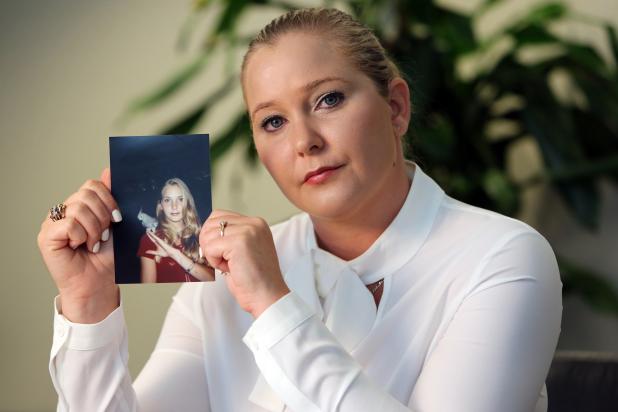
Ah yes, pouring oil on troubled waters. Virginia Giuffre's lawyers reached out to Andrew on many occasions, but he was still in denial mode. Did he think it would all go away if he ignored it for long enough? This all could been tidied up long before the Ghislaine Maxwell case came to trial. Virginia Giuffre could have been sent away with probably less than she will eventually get (the current figure seems to be about £5 million). How much better it would have been, for Andrew, for the Monarchy and no doubt of Virginia Giuffre herself. But now the damage is done. This has reached the courtroom steps, which has raised the stakes. Baring acts of God, bolts of lightning and other biblical interventions, both sides will settle. Andrew will have to settle. He can't – literally can't – be allowed to take the stand. For the brother of the future King of England to be cross-examined under oath even by video-link is unthinkable, as surely all parties must know. Neither is there much time. This needs dealing with quickly, so that it doesn't cause any more damage to the Royal Family, with the Platinum Jubilee approaching later this year. Neither can the Queen be seen to be bailing out her errant son – not in a matter like this. Instead the widely publicised sale of Andrew's ski chalet in Switzerland has been announced, to show that Andrew will foot the bill. It's all so inevitable, so predictable, and so badly handled. The only mystery is why it's all been allowed to drag on this long. Yet remarkably, and despite everything, Andrew still seems to think he has a future as a royal. Of all things, this is the most mind-boggling of all. Pictures have been released of Andrew smiling away, riding a horse in the grounds of Windsor Castle, as though he doesn't have a care in the world. Doesn't he get it? That he's finished? The Royal Family was ruthless with Edward the Eighth, or Edward Windsor after he abdicated. Prince Andrew might not quite be in that category, having to go into exile, but he can look forward to living very quietly somewhere, perhaps in the north of Scotland. Perhaps he could take up residence at the Queen Mother's former Scottish abode, the Castle of Mey, near Caithness. If he does, lets hope he's got plenty waterproofs for all that stormy weather; for he might be seeing quite a lot of it in the future. Arise Sir Tony
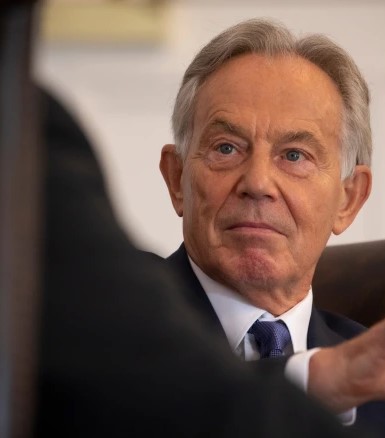
So Ole' Twinkle Toes has finally got his knighthood, 14 years after he left office. Not bad when you consider what kind of Prime Minister he has been. It all started so well. That early a.m. speech on the South Bank, when he said – to a tired but ecstatic audience the morning after the general election in 1997 – that he had fought as New Labour and he would govern as New Labour. And so Cool Britannia was born. The strains of ‘Things Can Only Get better’ continued to ring out, as he inherited 4 per cent growth and 2 per cent inflation from the outgoing Conservative government. General elections followed. The economy continued to expand. House prices soared and Tony Blair weas carried along, with his party and his government in tow. Squabbling between senior ministers like Peter Mandelson and Alastair Campbell and Gordon Brown hardly mattered, for Tony Blair proved one thing above all others: that the Tories couldn't touch him. There has probably never been a more astute politician, a greater Prime Minster for deftness, staying out of trouble and generally making sure his fingerprints were never left anywhere near the till. Other cabinet members resigned, were re-shuffled or walked out, but Tony sailed serenely on. When the history of all this is written, historians will wonder why a man with no particular convictions about anything, who was so in tune with what middle-class people would vote for, why someone like him got so involved in the Second Gulf War. It was the only time he acted out of conviction. It was the only time he went against his own party and the country. It was the only time he seriously misled Parliament and the nation – and he did all this when he didn't need to. Was it the messiah complex? The wish to get away from the opinion polls and the pragmatic politics he was so good at? Was he seduced by rides on the President of the USA's private jumbo jet, Air Force One? Whatever the reason, the same man who made that speech at the South Bank ended up as part of a conspiracy to wage an aggressive war on a false pretext – the same charges levelled against those on trial at Nuremburg. 
But there was no Nuremburg for Tony Blair. Ole' Twinkle Toes simply waltzed away once more, although his fingerprints were very definitely left on the till this time. He'd made his last real move, and he knew it, and it was time to do something different. And what could be more different than using his extensive contact book, so comfortably large after that decade as Prime Minister, to bring high-value individuals together to make deals, with a cut for Twinkle Toes of course. And so it was that the master fixer had a second – and tremendously lucrative – career. He brought a stately home in the home counties of England, while in Iraq families picked through the ruins of their houses, wreaked in the civil war, insurgency and the Islamic State that came in the wake of his intervention. And now Tony has his knighthood. 14 years late but never mind. It's a useful reminder that it's better to be an ex-British Prime Minister than a family living in Mosul, which had to endure an invasion, then ISIS, then a secular Iraqi state. Nice work if you can get it son; no wonder the Queen took 14 years to get around to giving it to him. |